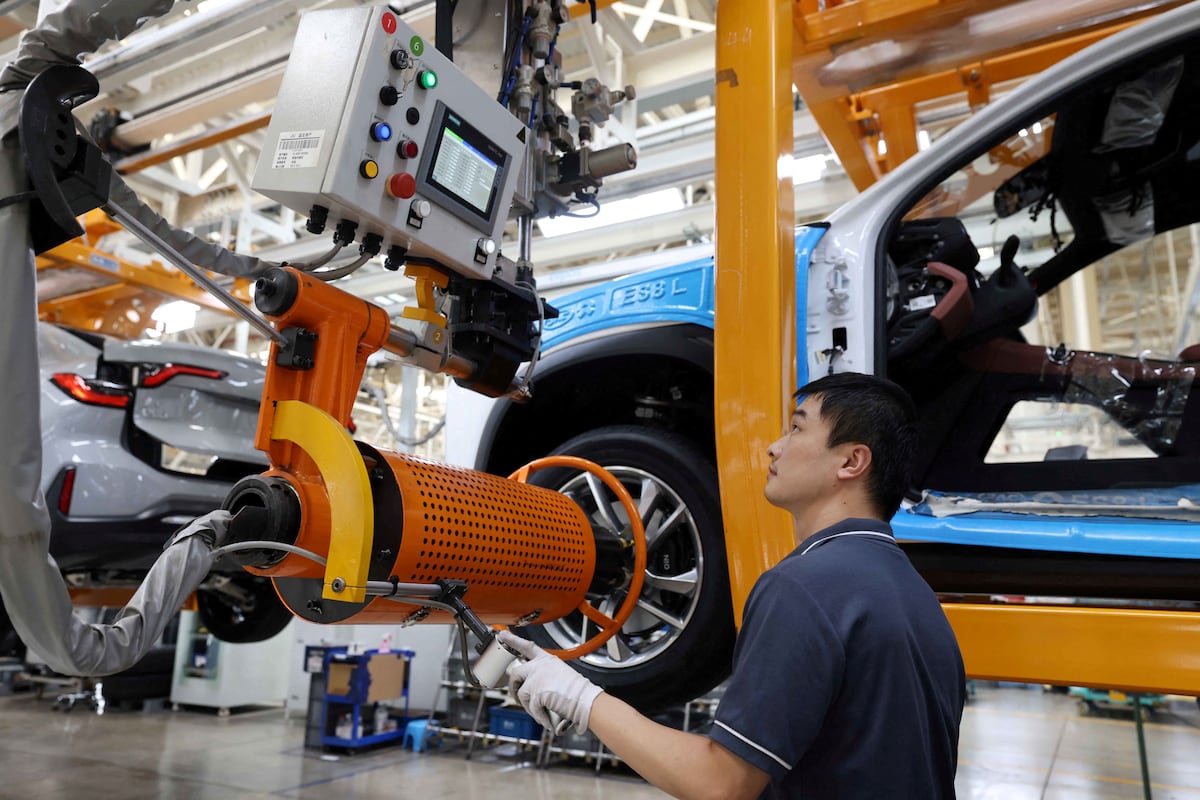Lockdowns in China: Hardly any German company can produce normally - according to the AHK, the situation is "unacceptable"
Created: 05/12/2022Updated: 05/12/2022 15:27
By: Christiane Kuehl
Quarantine worker in Changzhou: More and more cities in China are in lockdown.
German companies can hardly produce in the country © Sheldon Cooper/Imago/Zuma Wire
German companies are suffering severely from the Chinese government's corona measures.
According to the survey, three quarters of companies are affected by lockdowns.
Hardly any can produce normally.
Beijing/Munich – Hardly any other German company can currently start its assembly lines normally in China.
The reasons: disrupted supply chains, production bans, partial or complete curfews.
In a quick survey by the German Chamber of Foreign Trade (AHK) in China, 73 percent of the companies surveyed said they had locations and production sites in cities or regions with full or partial lockdowns.
In these areas, companies need a special permit to continue production despite the restrictions.
According to the survey presented on Thursday, just under every fifth company has such a permit (19 percent).
And even those with such a permit report major problems: On average, they produce at only 46 percent of their capacity.
Logistics problems, low availability of staff and uncertainties caused by sudden changes in regulations are the main reasons currently standing in the way of higher production, the chamber said.
Shanghai: Closed loop production
In the sealed off Shanghai, for example, around 2,000 companies are currently allowed to produce under certain conditions.
This includes the relevant employees having to live and work on the company premises for days – in what is known as the “closed loop.” The workforce then rotates after a few days.
Numerous companies are taking this drastic measure Bosch, Tesla, Foxconn, German medium-sized companies such as Wirtgen or Chinese companies - numerous companies are isolating their workers in the factories.
According to the regional chairman of the EU Chamber of Commerce Harald Kumpfert, some companies in the north-east Chinese city of Changchun – location of a joint venture by Volkswagen, among others – worked in the closed-loop system for four weeks or longer.
Many German companies remain closed.
"Functioning supply chains and a lack of trucks and drivers in sufficient numbers make operations difficult, even if permits are issued to resume work," said local AHK director Maximilian Butek, according to the
Bloomberg
news agency .
"Most German companies in China do not have sufficient facilities, such as dormitories, to provide factory workers with a safe and appropriate environment to sleep and live in the factories - nor can they provide adequate medical care in the event of an accident or emergency."
The resumption of production, especially in Shanghai, is going "very slowly", emphasized Claudia Barkowsky, Managing Director of the Association of German Machine and Plant Manufacturers (VDMA) in China, at the beginning of the week.
According to Butek, the mood among companies is deteriorating as the lockdown progresses.
"The majority of investments will be put on hold," said Butek.
New investments are difficult to justify as long as the zero-Covid policy remains the strategy of the authorities.
China: German companies are considering alternative locations because of the zero-Covid policy
The AHK World Business Outlook published in parallel in Berlin by the global German Chambers of Commerce Abroad (AHK) among 4,200 companies surveyed in the spring paints a similar picture.
The lockdowns in China have meant that almost half of the German companies based in the People's Republic (47 percent) feel compelled to critically reconsider their locations.
"When making decisions about suppliers, transport routes and production sites, companies must now increasingly consider political risks in addition to purely business factors," said Volker Treier, head of foreign trade at the Association of German Chambers of Industry and Commerce (DIHK).
That is why the different ways countries deal with the corona pandemic also play a role.
International criticism of China's zero-Covid policy is mounting.
Even the World Health Organization (WHO) called for a change of course on Tuesday.
WHO chief Tedros Adhanom Ghebreyesus stressed that he considered a realignment of the strategy to be "very important".
One in eight companies is even considering leaving China in favor of a location closer to the European or German home market.
"The example of China shows that companies don't make their location decisions overnight," said Treier from the DIHK.
“It usually takes years to establish oneself here.
And given the size of the country, relocation is all the more difficult.
The results of the survey are all the more astonishing.” In previous years, only a tiny minority of companies stated that they wanted to leave China due to various problems in the market environment – or that they no longer wanted to build factories in China but in other countries.
At the end of March, however, 27 percent of the companies emphasized in a similar AHK survey that they wanted to accelerate the transfer of activities to other Asian markets.
Zero-Covid: More and more foreign employees want to leave China
Due to the strict corona measures, China is also becoming increasingly unattractive for employees from abroad.
According to the AHK survey, around 28 percent of the skilled workers sent from Germany want to leave China because of the strict corona measures, and thus more than one in four.
"It will be extremely difficult for German companies to replace these employees with new employees from abroad," said Butek.
The current conditions for German companies in China are "unacceptable".
According to the EU Chamber of Commerce, the number of so-called "expatriates" - employees of foreign families, organizations or embassies and their families - has been falling steadily since the beginning of the pandemic in early 2020, much to the chagrin of companies.
(ck)













